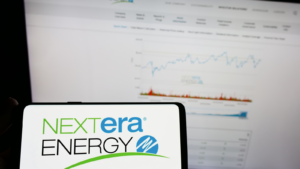In addition, technological developments are improving the effectiveness and decreasing the expenses of wind energy production. New techniques of turbine manufacturing and the use of advanced materials have enhanced efficiency and reliability. Thus, wind energy is a strong challenger to conventional energy sources.
Also, capital from both the private and public domains is being injected into wind energy related projects. These investments not only cover the present needs and demands of the business. But also, they contribute to its future development by means of increasing capital for research and development, expanding the infrastructure and increasing production capacity.
Of course, all of these are bullish factors for these seven wind stocks for investors to consider. So here are my favorite picks.
Vestas Wind ADR (VWDRY)

For the long-term investor, Vestas Wind ADR (OTCMKTS:VWDRY) shows a lot of potential. It is the market leader in the global wind turbine market, currently holding a 29% market share as of its Q1 of fiscal year 2024 results. I also like the fact that management is more concerned with the bottom-line than merely the sales revenue. This represents commercial thinking at its best and will help as the market develops.
The Service segment is a major advantage where the company has been able to steadily build its maintenance backlog of high-margin contracts with recurring revenue. The current investments in advanced technology of wind turbines like V163-4.5 MW model enables VWDRY to continue its lead in technology over its peers.
There are a few issues with regards to supply chain and project delivery in the short-term. However, Vestas Wind ADR is heading in the right direction. If anything, they could be contrarian buying signals.
NextEra Energy (NEE)

NextEra Energy (NYSE:NEE) is one of the largest producers of wind and solar energy in the U.S.
In addition, NextEra Energy has the largest renewable energy backlog in the industry. It has increased guidance for new wind and solar projects to between 36.5 GW and 46.5 GW. Not only does this enormous list of projects further establish the company as the leading renewable energy provider. But it also affords the company vast insight into projected future developments.
Also, several trends positively influence the wind power industry, and they are rather long-term trends such as the pivot away from thermal coal burning. Thus, being one of the industry leaders, NextEra Energy is able to take advantage of these trends and expand its market position.
Furthermore, I think that shares of NEE can be scooped up at a discount. Currently, they trade for just 24x earnings. And since we haven’t yet seen a significant rally for renewables, an upside could be priced in.
Clearway Energy (CWEN)

From my perspective as an investor, I am confident about the future of Clearway Energy (NYSE:CWEN) in the wind power business. It is one of the biggest intellectual property portfolios exclusively in the renewable power business. It boasts a total wind and solar power generation capacity of 6,200MW, as of its latest financial report.
CWEN’s wind business is characterized by high operational performance with availability and production factors above 90%. This underscores the company’s strength in managing the productivity of its wind farms irrespective of their regions’ locations. Also, Clearway Energy’s diversified national presence can reduce the effects of this weather risk on any single wind farm.
Another big reason for liking CWEN is it is a dividend payer, with a dividend yield of 6.2% at the time of writing. Furthermore, CWEN’s dividend has followed a strong growth rate at 7.76%, which indicates that management is committed to return value back to shareholders.
Brookfield Renewable Partners (BEP)

The strength of Brookfield Renewable Partners (NYSE:BEP) is that its assets are spread across the globe and across different types of energy. This geographical and technological diversification helps to reduce possible problems in a particular renewable energy project or area due to weather or government changes. Significantly, 90% of BEP’s power generation is hedged through long term power purchase agreements, which makes it even more stable.
The company has been able to record double-digit annual growth in funds from operations. This boosts my confidence in the company’s prospects to deliver market-beating returns.
Also, BEP could be hovering at undervalued levels. Trading at 3.08x sales, analysts predict positive accounting profits in the near future. Therefore, all these factors point to BEP as a wind stock to buy.
Atlantica Sustainable Infrastructure (AY)

Atlantica Sustainable Infrastructure (NASDAQ:AY) is one of the world’s largest sustainable infrastructure companies. It operates in the sectors of renewable energy, natural gas, electricity, water and other utilities.
In addition to building the needed energy generation infrastructure, the company has several ongoing projects. These are nearly all in the solar, wind and energy storage solutions.
I believe that AY is in the process of turning a corner financially. This is evident in the financial performance of the company, especially in its cash flows. Increase in operating cash flows by 57% were reported in Q1 FY24. And, AY’s ability to meet its expansionary strategies entails sound capital policy and cheap availability of capital.
Despite its high valuation at 53x earnings, I believe that the company’s assets cannot be easily imitated. This, along with its operational milestones, make it one of those wind stocks to buy.
Algonquin Power & Utilities (AQN)

Algonquin Power & Utilities (NYSE:AQN) has caught my attention as one of those wind stocks to consider. A major catalyst for my bullish outlook is the company’s plan to sell its renewable energy business. This move will allow the company to focus on its core regulated utility operations.
Also, AQN will be able to use the proceeds from the renewable asset sale to significantly reduce its debt levels and interest expenses, and increase flexibility. Although AQN has had some strategic errors in the past, I am pleased with the company’s recent refocusing on its core regulated utility business and the attempts to improve its capital structure.
Another great point about Algonquin Power & Utilities is that it trades at a reasonable 1.79 times sales. That is considerably lower than many of the companies studied in this article. It then might be an undervalued bargain waiting for investors to consider.
First Trust Global Wind Energy ETF (FAN)

I recommend buying First Trust Global Wind Energy ETF (NYSEARCA:FAN) to long term investors. This fund offers access to the global market for companies that are engaged in the production of wind energy equipment. Thus, it offers a way to profit from the increasing shift towards clean energy.
FAN has a number of strengths, one of which is its scope, focused on the leaders of the wind power supply chain. I refer to turbine makers, project developers and utility companies. This diversification allows the fund to capture opportunities in the wind energy sector.
The firm’s international presence includes assets located in Europe, North America and Asia. So, it reduces the risk linked to the specific country’s regulation and macroeconomic environment. It has a reasonable expense ratio of 0.60% and a market cap of $191.87 million.
For investors who are unwilling to risk it all on one or two companies, I think that FAN could be an option to consider. After all, it holds 60 stocks in total, more than enough for sufficient diversification.
On the date of publication, Matthew Farley did not have (either directly or indirectly) any positions in the securities mentioned in this article. The opinions expressed are those of the writer, subject to the InvestorPlace.com Publishing Guidelines.
On the date of publication, the responsible editor did not have (either directly or indirectly) any positions in the securities mentioned in this article.
Matthew started writing coverage of the financial markets during the crypto boom of 2017 and was also a team member of several fintech startups. He then started writing about Australian and U.S. equities for various publications. His work has appeared in MarketBeat, FXStreet, Cryptoslate, Seeking Alpha, and the New Scientist magazine, among others.
